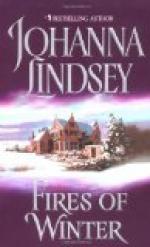“‘Death and the devil!’ said he. ’It’s one or both, either way; and I prefer ’em hot to cold!’
“He drank off half the glass, smacked his lips, and stood staring a moment.
“‘Dear, dear!’ said the gal, in a voice like falling water, ’you’ve drunk blood, sir!’
“My grandfather gave a yell, slapped the rest of the liquor in the faces of his friends, and threw the cup agen the bars. It broke with a noise like thunder, and at that he up’d with his hands and fell full length into the snow.”
There was a pause. The little man by the door was twisting nervously in his chair.
“He came to—of course, he came to?” said he at length.
“He come to,” said the banjo solemnly, “in the bitter break of dawn; that is, he come to as much of hisself as he ever was after. He give a squiggle and lifted his head; and there was he and his friends a-lyin’ on the snow of the high downs.”
“And the house and the gal?”
“Narry a sign of either, sir, but just the sky and the white stretch; and one other thing.”
“And what was that?”
“A stain of red sunk in where the cup had spilt.”
There was a second pause, and the banjo blew into the bowl of his pipe.
“They cleared out of that neighbourhood double quick, you’ll bet,” said he. “But my grandfather was never the same man agen. His face took purple, while his friends’ only remained splashed with red, same as birth marks; and, I tell you, if he ever ventur’d upon ‘Kate of Aberdare,’ his cheeks swelled up to the reed of his clarinet, like as a blue plum on a stalk. And forty year after, he died of what they call solution of blood to the brain.”
“And you can’t have better proof than that,” said the little man.
“That’s what I say,” said the banjo. “Next player, gentlemen, please.”
DARK DIGNUM
“I’d not go higher, sir,” said my landlady’s father. I made out his warning through the shrill piping of the wind; and stopped and took in the plunging seascape from where I stood. The boom of the waves came up from a vast distance beneath; sky and the horizon of running water seemed hurrying upon us over the lip of the rearing cliff.
“It crumbles!” he cried. “It crumbles near the edge like as frosted mortar. I’ve seen a noble sheep, sir, eighty pound of mutton, browsing here one moment, and seen it go down the next in a puff of white dust. Hark to that! Do you hear it?”
Through the tumult of the wind in that high place came a liquid vibrant sound, like the muffled stroke of iron on an anvil. I thought it the gobble of water in clanging caves deep down below.
“It might be a bell,” I said.
The old man chuckled joyously. He was my cicerone for the nonce; had come out of his chair by the ingle-nook to taste a little the salt of life. The north-easter flashed in the white cataracts of his eyes and woke a feeble activity in his scrannel limbs. When the wind blew loud, his daughter had told me, he was always restless, like an imprisoned sea-gull. He would be up and out. He would rise and flap his old draggled pinions, as if the great air fanned an expiring spark into flame.




